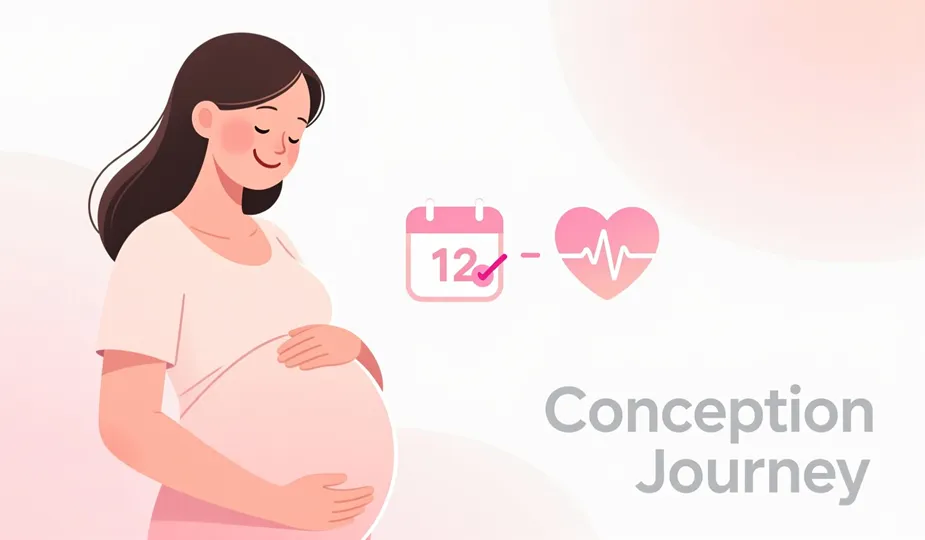Pregnancy Conception Calculator
Estimate your likely conception date, due date, and fertile window using NHS-based guidelines for UK women, with features adapted for US and global audiences. This tool gives an approximate calculation and should not replace professional medical advice. Always consult your GP, midwife, or healthcare provider.
Pregnancy Conception Calculator
Planning a pregnancy or simply curious about your fertile days? Our free Pregnancy Conception Calculator helps you estimate the most likely date of conception, your ovulation date, and your fertile window. Based on NHS guidance for the UK, and widely recognised methods across the US and globally, this tool offers an easy way to better understand your cycle and fertility patterns.
What is a Pregnancy Conception Calculator?
A Pregnancy Conception Calculator is designed to predict the days in your menstrual cycle when you are most fertile. Since ovulation (the release of an egg from the ovary) typically happens about 14 days before the start of your next period, this tool works by calculating your ovulation date using the first day of your last menstrual period and your average cycle length.
By entering these details, you will receive an estimate of:
- Your expected ovulation date
- Your fertile window (the days when you are most likely to conceive)
- An estimated conception date if pregnancy occurs
How to Use the Pregnancy Conception Calculator
Using the tool is simple and straightforward. Here’s how it works:
- Select the first day of your last menstrual period.
- Enter your average cycle length (commonly 28 days, but cycles can vary between 20–40 days).
- Click “Calculate” to see your estimated ovulation date and fertile window.
If you are unsure of your cycle length, start with 28 days as the average. Over time, tracking your cycles can help you adjust for better accuracy.
Features of the Calculator
- UK NHS Standard: Designed with NHS guidance in mind for accurate UK-focused results.
- Global Adaptation: Includes terminology for US and global audiences to make it accessible everywhere.
- Language Toggle: Choose between UK English, US English, or global phrasing for clarity.
- Download PDF: Save your results for future reference or share them with your midwife, GP, or healthcare provider.
- Share Result: Instantly share your results with your partner or support group.
- Responsive Design: Works beautifully on desktop, tablet, and mobile devices.
Why Knowing Your Fertile Window Matters
Understanding your fertile window is especially helpful if you are trying to conceive. The fertile window typically spans 5 days before ovulation and 1 day after. This is when sperm and egg are most likely to meet, giving you the best chance of pregnancy.
Equally, for those wanting to avoid pregnancy, being aware of fertile days is important—although it should never replace professional medical advice or contraception.
Pregnancy Conception and Your Body
Every woman’s cycle is unique, and factors such as stress, diet, exercise, and health conditions can influence ovulation. While this calculator provides useful estimates, medical scans and tests remain the most accurate way to confirm pregnancy and due dates.
In the UK, the NHS recommends a 12-week scan as part of antenatal care. This scan can confirm how many weeks pregnant you are and provide a more accurate due date. In the US and globally, early ultrasound scans are also common practice.
Week-by-Week Pregnancy Insights
Once conception occurs, your body begins an incredible journey. Here’s a brief week-by-week overview:
- Weeks 1–2: Your body is preparing for ovulation. These are counted as part of pregnancy even though conception hasn’t happened yet.
- Week 3: Fertilisation usually occurs, and the fertilised egg travels to the uterus.
- Week 4: The embryo implants in the womb lining, and early pregnancy hormones start rising.
- Weeks 5–8: Major organs begin to develop, and many women notice early pregnancy symptoms like fatigue or nausea.
- Weeks 9–12: The first scan is offered in the UK. The foetus is fully formed, though still tiny.
- Weeks 13–20: Growth accelerates, and you may start to feel baby’s movements.
- Weeks 21–30: The baby’s senses develop, and weight gain increases steadily.
- Weeks 31–40: The final stretch. Your baby prepares for birth, and you prepare to welcome your new arrival.
These milestones are approximate, as every pregnancy progresses slightly differently.
Important Note
This “Pregnancy Conception Calculator” tool is meant as a guide, not a medical diagnosis. If you are unsure about your cycle, conception, or pregnancy, always consult your GP, midwife, or healthcare provider.
